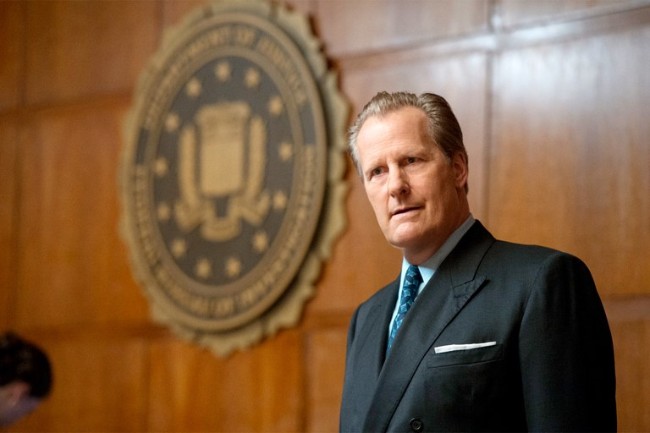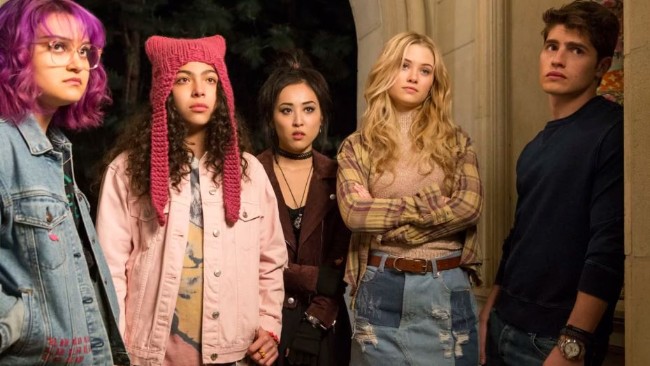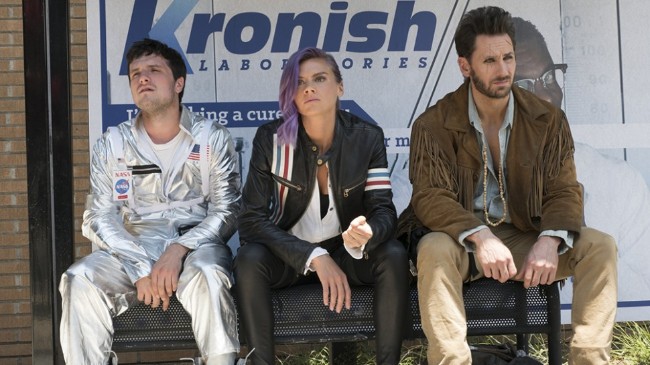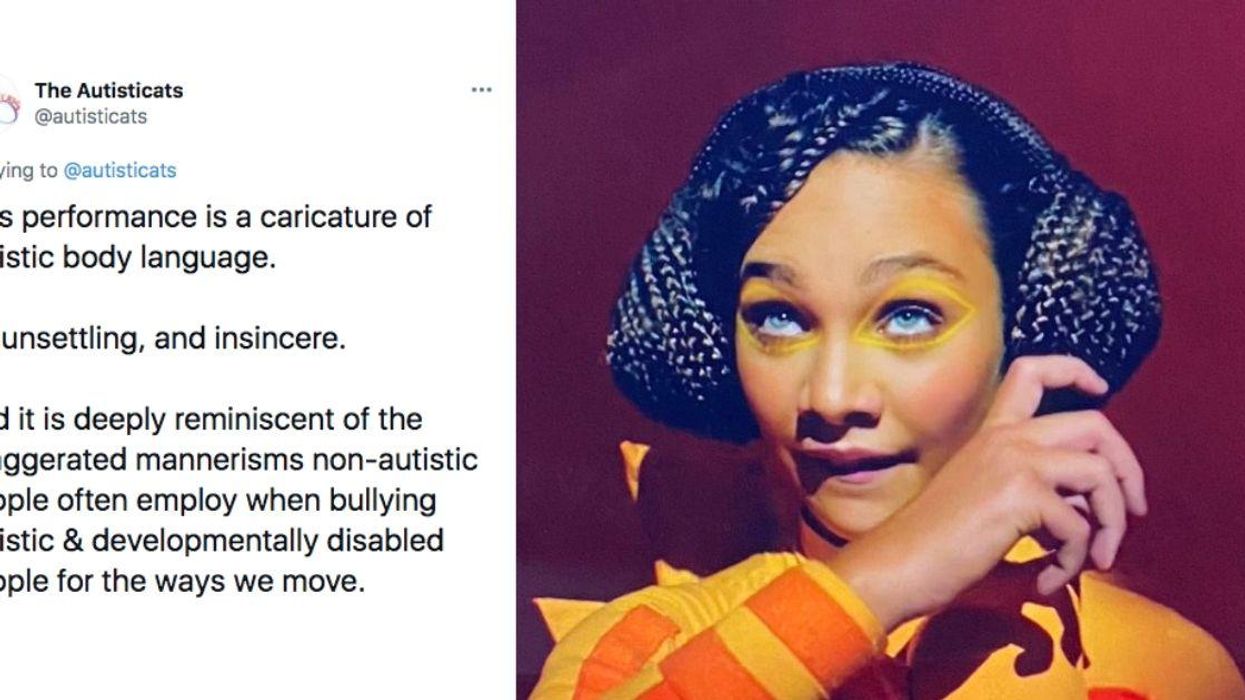
Last Updated: February 17th
Hulu is more than just a place to catch network TV’s next-day airs. The streaming platform has ramped up its original content, going all-in on thoughtful and entertaining storytelling with its line-up of TV shows. There’s a genre for everyone here — dystopian sci-fi, family drama, fantasy-themed horror, etc. — so there’s really no excuse not to add at least one of these shows to your watchlist.
Related: The Best TV Shows On Hulu Right Now
1. The Handmaid’s Tale

3 seasons, 36 episodes | IMDb: 8.5/10
Based on the Margaret Atwood novel of the same name, Handmaid’s Tale is set in a dystopian future run by a fundamentalist government renamed Gilead. The fertility rate has bottomed out, women have been deprived of their rights, and the men have turned them into reproductive vessels. This future, however, is so recently removed from the present that the misery of the women — forced to be submissive through electroshock and other forms of torture — is compounded by haunting memories of their most recent past. Top-lined by the exceptional performance of Elizabeth Moss, the series also boasts strong supporting turns from Yvonne Strahovski, Samira Wiley, Joseph Fiennes, and Alexis Bledel, whose character attempts to rebel against the autocratic government and suffers excruciating consequences. It’s a harrowing series, often so bleak that it’s difficult to watch, but in our current political climate, the themes of The Handmaid’s Tale resonate loudly, and the second season is even darker and more powerful.

2. Normal People
1 season, 12 episodes | IMDb: 8.5/10
3. Castle Rock

2 seasons, 20 episodes | IMDb: 7.7/10
Stephen King experienced a bit of a renaissance this year, at least on TV, but out of all of the adaptations from different streaming platforms, Hulu’s Castle Rock felt like the most realized, and most terrifying, of the lot. The show, which stars Sissy Spacek, Andre Holland, and Bill Skarsgard, follows the story of Henry (Holland) a death row attorney summoned home after a young man is found imprisoned beneath Shawshank prison. Henry’s got a murky past too, one that involves the unsolved murder of his father –- an event he has no memory of — and the strange happenings around town intensify as The Kid (Skarsgard) is set free and must figure out how he’s connected to Henry, his family, and the history of the town. It’s equal parts brilliant and terrifying, all you could ask for in a King adaptation. The show’s second run feels just as compelling, with Lizzy Caplan stepping into the orthopedic shoes of nurse Annie Wilkes, before her Misery days. She still troubled and causing trouble for the town of Castle Rock while trying to keep to the shadows with her daughter played by Eighth Grade’s Elsie Fisher.
4. Casual

4 seasons, 44 episodes | IMDb: 7.5/10
Michaela Watkins stars as Valerie, a forty-something Mom whose husband just left her for a grad student in one of his classes (it’s a cliche for a reason). She and her daughter move in with her layabout brother, Alex (Tommy Dewey), an independently wealthy co-creator of a dating website. Alex is caddish but intensely likable, especially once viewers realize that his womanizing is a pretense, that he’s simply too afraid to reveal his true self for fear of rejection. Like Transparent, with which Casual shares some DNA, there’s an organic, improvised feel to the series, which alternates between funny and heartbreaking as it seeks to find the humor in the devastation of loss and the awkward challenges of finding someone new. It’s a tremendously good show that only gets better in its later seasons.
5. The Act

1 season, 8 episodes | IMDb: 8/10
Patricia Arquette and Joey King star in this painfully measured series that follows the true story of Gypsy Rose Blanchard. Gypsy Rose was a young woman living with her mother, Dee Dee, in a small town in Missouri when police found her mother murdered in their home, and Gypsy nowhere to be found. The mystery surrounding the case soon spiraled into a story about the complicated bonds between mother and daughter, chronicling one woman’s descent into madness. Dee Dee suffered from Munchausen syndrome by proxy, a condition that caused her to fake many of Gypsy’s “illnesses” — from cancer to brain damage. When Gypsy finally realized the truth, she concocted a plan so outrageous and heinous, it had to be given the TV treatment.
6. PEN15

2 seasons, 17 episodes | IMDb: 7.9/10
Maya Erskine and Anna Konkle write, direct, and star in this cringe-worthy coming-of-age comedy about two preteens entering the 7th grade. The twist here is that both Erskine and Konkle, actresses in their 30s, play their middle-school-aged characters alongside actual 13-year-olds, elevating their comedy about awkward firsts and embarrassing pubescent mishaps to new heights. The show is full of humor while also covering some relatable, real-life issues that normally don’t make it to the small screen.
7. Ramy

2 seasons, 20 episodes | IMDb: 8.1/10
Comedian Ramy Youssef stars in this semi-autobiographical dramedy, playing a version of himself, a character named Ramy Hassan. Ramy navigates life growing up in New Jersey while straddling the line between the millennial generation he’s a part of and the Muslim community he belongs to. He wrestles with the constraints of his religion and his upbringing, while searching for meaning in more modern pursuits — drinking, partying, and hooking up. It’s heartwarming, eye-opening, and never takes itself too seriously.
8. Letterkenny

9 seasons, 61 episodes | IMDb: 8.6/10
You’ve probably found yourself asking, “What the hell is Letterkenny?” That question has probably come after yet another friend/co-worker/stranger on the street has stopped you to demand you watch the Hulu original. Well, here’s the answer: Letterkenny is a snappy comedy about a group of small-town folk just trying to get by. It mainly centers on two bros, Wayne and Darryl, and the schemes they come up with to make a buck, have a good time, and stir up their boring old town.
9. Catch 22

1 season, 6 episodes | IMDb: 7.8/10
George Clooney, Kyle Chandler, and Christopher Abbott star in this re-telling of Joseph Heller’s classic novel. Abbot plays young recruit, Yossarian, a U.S. Air Force bombardier in World War II. Yossarian hopes to dodge having to serve in combat after the military ups the number of missions required before one’s service can be considered complete. He’s forced to face off against a truly sadistic colonel while fighting for his life on the front line. It’s ridiculous that Abbott isn’t a bigger name than he is, but he leads this farcical troupe with A-list swagger, and Chandler is surprisingly wonderful playing against his normal, lovable-dad typecasting.
10. Veronica Mars

1 season, 8 episodes | IMDb: 8.3/10
The cult teen drama returns after a years-long hiatus and a successful Kickstarter-funded film to re-open the case. This time, Veronica (Kristen Bell) is investigating a catastrophic bombing of a popular spring break destination for college kids: Neptune, her hometown. She’s also struggling to balance her career and her tumultuous relationship with Logan (Jason Dohring) while pushing her ailing father to come clean about his health issues. This season, which is intended to be a continuance — so you should definitely check out Rob Thomas’ original work, also available on Hulu — marks a return to the show’s noir crime roots, and it’s so much better for it.
11. The Looming Tower

1 season, 10 episodes | IMDb: 8/10
This historical drama starring Jeff Daniels and Peter Sarsgaard charts the build-up to 9/11 as seen through the eyes of agents in both the FBI and CIA. Daniels plays John O’Neill, the chief of the New York FBI’s Counterterrorism Center in the 1990s, who is convinced that a terrorist attack on the U.S. is imminent. He butts heads with Martin Schmidt (Sarsgaard), the CIA head of counterterrorism, who believes his agency is better equipped to deal with the threat of Al Qaeda and keeps valuable intel from the FBI. The action in this comes from watching Daniels and Sarsgaard, two incredibly talented actors, go head-to-head, chewing up every scene they’re in and obviously having fun doing it.
12. Shrill

2 seasons, 14 episodes | IMDb: 7.4/10
SNL breakout Aidy Bryant headlines this comedy series based on the best-selling book by Lindy West. Bryant plays Annie, a young writer living on the West Coast who struggles with body image issues, a floundering career as a journalist, and a family health crisis. Over the course of six episodes, she manages a toxic relationship with her sometimes-hookup, confronts an abusive boss, and takes on internet trolls, all while learning how to love her size. Bryant shines here and though there’s not as much in-your-face comedy from her as SNL fans might be used to, her quiet, reserved style better serves the story, which is a refreshing one.
13. Runaways

3 seasons, 33 episodes | IMDb: 7.1/10
Adapted by Josh Schwartz and Stephanie Savage from Adrian Alphona and Brian K. Vaughan’s Marvel comic, Runaways is a slick, briskly paced teen soap featuring high school students discovering and coming to terms with their burgeoning superpowers. Runaways finds that happy space between the heaviness of Marvel’s Netflix dramas and the more lightweight nature of their network series (Agents of SHIELD, Agent Carter). It’s a potent combination of compelling mystery and coming of age tale. The teen characters here are fantastic as they grapple with their own powers while investigating the dark history of their parents. Runaways takes a lot of cues from Schwartz and Savage’s The O.C. and Gossip Girl, respectively, although the series is not half as interesting when it’s exploring the conspiracy surrounding the parent characters, who are essentially the series’ supervillains. That storytelling deficit, however, is more than made up for by the existence of a dinosaur!
14. Future Man

3 seasons, 34 episodes | IMDb: 7.8/10
From creators Kyle Hunter and Ariel Shaffir and executive producers Seth Rogen and Evan Goldberg (the team behind Sausage Party), Future Man is basically a mash-up of The Last Starfighter, Back to the Future, and The Terminator. Josh Hutcherson stars as Josh Futterman, a loser-ish janitor at a science lab who becomes the first person ever to finish a nearly impossible-to-beat video game. The game, it turns out, is a training application sent back from the future to find humanity’s savior. Characters from the video game recruit Josh to travel back into the past to kill the head of the science lab (Keith David) where Josh works in the present to prevent his boss from developing a cure for herpes that somehow ends up wiping out humanity in the future. There’s a lot to unpack in its premise, but once Future Man gets to its feet and finds its heart, the character evolves into more than mouthpieces for quick-fire pop-culture riffs. Eliza Coupe (Happy Endings) is fantastic as a fast-talking badass with an arsenic-laced “rathole” and a fondness for hand-to-hand combat. It’s Preacher’s Derek Wilson, however, who proves to be the scene stealer. He’s basically Firefly’s Jayne Cobb plus an obsession with ’80s pop culture, cooking, and two-hit wonder Corey Hart, who also makes a cameo appearance. It’s a fast-paced, filthy, and hilarious homage to time-travel movies that boasts a hysterical hatred for James Cameron, who is the target of a lot of the series’ best jokes. What Future Man lacks in substance, it more than makes up for in laughs and season two of the series doubles down on that philosophy, thrusting characters in even more bizarre situations and tighter spandex costumes.
15. Harlots

3 seasons, 22 episodes | IMDb: 7.7/10
Written and directed by women (Moira Buffini and Coky Giedroyc, respectively), Harlots is set in 1763 England where one in every five women is a prostitute. The story concerns two competing brothels operated by Lydia Quigley (Lesley Manville) and Margaret Wells (Samantha Morton), the latter of whom reluctantly pimps out her two daughters, one of whom is a popular courtesan (Downton Abbey’s Jessica Brown Findlay) and another whose maidenhead is being auctioned off at a hefty price. There’s plenty of sex in Harlots, as one might expect from a series about competing brothels, but it’s not a sexy show. It’s more of a serious family drama about hardscrabble women using the only card they have in their 18th-century deck in an effort to maintain some sense of control over their lives. There’s power in sex, but as Harlots reveals, it only gets them so far. The series is a thoughtful costume drama that can be bleak at times (the corpse of a prostitute is used as a gruesome prop in the ongoing war between the brothels), but there are moments of crackling wit and a few stand-out performances, particularly that of Samantha Morton. Unfortunately, as the series’ first season progresses, it loses some of its momentum as it gets bogged down in its more soapy elements.
16. 11.22.63

1 seasons, 8 episodes | IMDb: 8.2/10
Produced by J.J. Abrams and created by Bridget Carpenter (a writer on Parenthood, Friday Night Lights), 11.22.63 is adapted from a Stephen King novel and stars James Franco as newly divorced high school teacher, Jake Epping, who finds a portal that takes him back to October 1960. There, Jake decides to prevent the assassination of John F. Kennedy, though doing so will upend the life he has made for himself. It’s an exhilarating premise, and it’s nearly impossible not to get hooked by the pilot. Unfortunately, once Epping finds himself in the 1960s, the series drops many of the time-travel elements and settles into a more conventional — and often tiresome — conspiracy thriller. Franco is solid in the lead role, but the series is derailed by its devotion to the source material. It’s not one of King’s best books, and while it does provide viewers with a satisfying, heartfelt pay-off, the slow pace makes the journey more of a chore than the destination ultimately warrants.
17. Chance

2 seasons, 20 episodes | IMDb: 7.7/10
Based on the Kem Nunn novel of the same name, Chance stars Hugh Laurie as a forensic neuropsychiatrist, Dr. Eldon Chance. Chance — who is going through a divorce — becomes romantically involved with a patient named Lucy (Greta Lee). Pulled into her troubled life, Chance finds himself embroiled in a dispute between the femme fatale and her abusive husband, a violently jealous police officer who has his sights set on Chance. It’s a moody, psychological noir with heavy doses of intrigue and mystery, but the pacing here suggest that it would have been better told in half the number of episodes. The series too often drifts and seems more preoccupied with mood setting than telling a story. Hugh Laurie’s compelling performance keeps it afloat, while Ethan Suplee — who plays a street-smart assistant in an antique shop — steals every scene he’s in, delivering occasional bursts of violence to stir viewers awake.
18. The Path

3 seasons, 36 episodes | IMDb: 7.3/10
Set in upstate New York, The Path concerns members of a fictional spiritual moment (or cult) called Meyerism. The series primarily revolves around Eddie Lane (Aaron Paul), who has a revelation while on a retreat that leads him to question his faith. Eddie, however, won’t confess his doubts to his devout wife, Sarah (Michelle Monaghan), who believes her husband is hiding an affair from her. Things are further complicated by Cal (Hugh Dancy), the charismatic and corrupt leader of the Meyerist Movement, whose ambitions are often at odds with the more altruistic motives of the movement. While featuring strong performances from its leads, The Path is an achingly slow burn that doesn’t catch fire until near the end of the first season only to fizzle out again when the second season kicks off. There’s a fascinating story being told on The Path, but it’s not currently one that warrants 10 episodes a season, and the series often labors to spread its thin story across a canvass that is too large. The magical realist elements of the series only exacerbate its problems. It’s not a bad show thanks to the strong efforts of its leads, but it is one that struggles to figure out what it wants to say. Unfortunately, it got the ax after three seasons.
19. High Fidelity

1 season, 10 episodes | IMDb: 7.5/10
Zoe Kravitz produces and stars in this departure from Nick Hornby’s beloved 1995 novel, playing a young record store owner who fights against the gentrification of her Brooklyn neighborhood while replaying a string of failed relationships to the tune of indie hits. The story feels like a more mellow version of Phoebe Waller-Bridge’s Fleabag, and the soundtrack is fire.
20. Devs

1 season, 6 episodes | IMDb: 8/10
The brains behind sci-fi thrillers like Ex Machina and Annihilation gives us another mind-bending drama, this time for the small screen. Devs focuses on a young software engineer named Lily Chan who begins digging into a secret division of the cutting-edge tech company she works for in Silicon Valley because, get this, they probably murdered her boyfriend.
21. Woke

1 season, 8 episodes | IMDb: 6.2/10
New Girl’s Lamorne Morris stars in this imaginative comedy series about a Black cartoonist on the rise who suddenly has his eyes opened to the injustice and inequality surrounding him. Morris plays Keef, a talented artist keeping things light with his work — which is set to go mainstream — until a violent run-in with the police leaves him questioning his reality. It’s timely for sure, taking an inventive approach to the Black Lives Matter moment, but there’s still plenty of humor to keep it all grounded.
22. The Great

1 season, 10 episodes | IMDb: 8.1/10
Elle Fanning and Nicholas Hoult star in this period dramedy that riffs heavily off the vibe of Yorgos Lanthimos’ Oscar-nominated flick, The Favourite. Hoult has a hell of a lot of fun playing a sadistic sociopath who just so happens to be the Emperor of Russia. Fanning is his hopeful bride-to-be who comes to the palace looking for love and ends up launching a coup and a plot to murder her new husband. It’s a deliciously fun show filled with absurd characters and too many memeable quotes to count.
23. Little Fires Everywhere

1 season, 8 episodes | IMDb: 7.8/10
Reese Witherspoon and Kerry Washington turn in riveting performances in this Emmy-nominated drama. The show, based on Celeste Ng’s 2017 bestseller, follows Witherspoon’s character, the matriarch of the picture-perfect Richardson clan, as she desperately tries to hold onto her idyllic life. Enter Washington, a mother of a young girl, who exposes the family’s secrets and upends their small community.
24. Taste The Nation With Padma Lakshmi

1 season, 10 episodes | IMDb: 8.3/10
Top Chef host Padma Lakshmi takes her culinary TV talents to the next level in this hybrid travel/cooking show that introduces audiences to the rich, culturally diverse cuisine being created right here in the states. Lakshmi travels across the country, learning about indigenous and immigrant communities and taste-testing the delicious, inventive food they’re cooking. She’s also breaking down barriers and disrupting societal norms, but the food porn is just so good, most people probably won’t realize they’re learning something while they watch her snack on El Paso burritos and indigenous fry bread.
25. Dollface

1 season, 10 episodes | IMDb: 7.3/10
Kat Dennings stars in this dramedy about a young woman named Jules, who returns to single life after her long-term boyfriend dumps her. After being coupled for so long, Jules resorts to using her imagination to literally (and metaphorically) re-enter the world of female friendships and the dating pool.
Recent Changes Through February 2021
Added: Normal People
Removed: The Wrong Mans









 ˣ⁴ IS GETTING 80/20 (@ungodlyalexis)
ˣ⁴ IS GETTING 80/20 (@ungodlyalexis) 

 (@TheHatedGay)
(@TheHatedGay) 

 (@xoraveen)
(@xoraveen)  love to see it.
love to see it. 
 (she/her) (@nadinevdVelde)
(she/her) (@nadinevdVelde)  (@cmclymer)
(@cmclymer) 